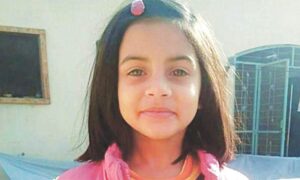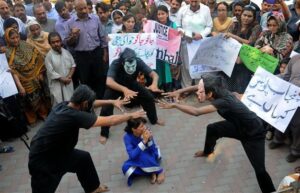
Hey Hira, why are you petrified of the darkness? Why are you so quiet? Are you scared of our teacher? Hello, auntie, I’m Hira’s friend. I don’t know what’s going on in her mind, but I want to ask you if she stays quiet at home too? Is she terrified of her dad too? You know she never talks to anyone in school! She never sits with any boy or girl in the school as well. She was not like this before!
Do you know the reason behind Hira’s silence? It’s rape!
Hira’s case is not the only case we have heard of. Many innocent girls like Hira have faced the same life-changing situation. Some of these brave girls are lucky that they are safe, at least life has given them one more chance to live. However, these girls live their lives with shame, trauma, and mental disorders. Many are not lucky enough to be alive as they are instantly murdered after they are raped.

Zainab Ansari, 8 year old rape victim
Zainab Ansari’s case was known worldwide! An eight year old girl was found dead in a garbage dump. Through DNA testing and autopsy, it was found that the girl was abused for some time by the rapist Imran Ali before he suffocated her to death.
A two-and-a-half-year-old girl also named Zainab belonging to Peshawar was found dead as someone raped, tortured, mutalated, assaulted, and stabbed to death, however the media and the politicians claimed that there was a rift between the father of the girl and the rapist and hence this crime was committed.
In the ciry of Manshera a four-year girl named Janat underwent the same catastrophe as Zainab Ansari, had been sexually assaulted and tortured before being killed. So many rape cases don’t get reported in Pakistan, due to shame and honor. It is the girl who suffers either way. Many families, don’t report these kinds of cases to the police as those families are usually shunned from the communities as well as their daughters never get married.
Freda Adler, American Criminologist and Educator states, “It is little wonder that rape is one of the least-reported crimes. Perhaps it is the only crime in which the victim becomes the accused and, in reality, it is she who must prove her good reputation, her mental soundness, and her impeccable propriety.”
 Pakistan is among the ten worst countries in the treatment of women or girls. Every day, 11 rape cases are reported in Pakistan. Twenty-two thousand rape cases have been reported in the last six years. Pakistan, a country known for its Secular/Democratic/Islamic laws, has failed to punish these criminals who have raped children and murdered them afterwards. According to the Islamic laws, punishment for rape is the death penalty or imprisonment for 10 to up to 20 years. Punishment for gang rape is death or life imprisonment. Yet very few have received such sentences.
Pakistan is among the ten worst countries in the treatment of women or girls. Every day, 11 rape cases are reported in Pakistan. Twenty-two thousand rape cases have been reported in the last six years. Pakistan, a country known for its Secular/Democratic/Islamic laws, has failed to punish these criminals who have raped children and murdered them afterwards. According to the Islamic laws, punishment for rape is the death penalty or imprisonment for 10 to up to 20 years. Punishment for gang rape is death or life imprisonment. Yet very few have received such sentences.
This Islamic law was implemented when General Zia-ul-Haq came into power in the late 70’s. Under his Presidency, the accused rapists in 1981 were arrested, executed in public, and their bodies were hanged till sunset. A false statement then started circulating that the punishment for the rapists was so severe that there were no rape cases reported for ten years. But rape cases were increasing in Pakistan especially after the introduction of the Hudood Ordinances. Hudood Ordinances were a set of laws introduced by President Zia Ul Haq in 1979 in order to bring the Sharia Laws for criminal offences. A new set of criminal offences were added which included adultery (cheating on your spouse) and fornication (sex before marriage), and new punishments of whipping, amputation, and stoning to death were included as well.
When a woman would come to report a rape, she would be accused of fornication or adultry and hence incarcerated. Many women suffered as victims of rape for years. There was hardly any justice for women under such laws. Some of the women were as follows:
In 1983, a domestic female worker Safia Bibi who worked at the local landlord’s home was raped by the landlord Muhammad Ali (himself) and the landlord’s son, Maqsood Ahmed. She did not report the rape and was pregnant soon after and gave birth. The child died shorly. The father of Safia Bibi reported the incident to the police and the perpetrators were caught shortly but acquitted due to lack of evidence. Safia was tried and found guilty of Zina (fornication) under the Zina (extramarital) Ordinance, part of the Hudood Ordinances. She was sentenced to public lashings (15 lashes), 3 years jail and Rs 1,000 fine. The facts that she was unmarried and had herself admitted to having become pregnant due to the rape were taken as evidence against her.
In 2002, Zafran Bibi walked into the police station in the village of Kerri Sheikhan, in Pakistan’s North West Frontier, and reported that she was raped by a neighbour. During the trial she changed her statements a few times, resulting in the judge acquitting the rapist Akmal Khan and acused Zafran Bibi of adultery and as punishment she was sentenced to stoning to death and that she be stoned to death at a public place.

In 2005, a now-famous politician Mukhtar Mai was molested and raped by the men of her village as a punished for her teenage brother’s alleged affair with their 28-year-old sister. This was the first time a rape case of Pakistan was highlighted in international media. Her rapists too were acquitted and she is still vocal about her case.
On the 15th of November 2006, the National Assembly of Pakistan passed the Ladies Security Charge to correct the intensely scrutinized 1979 Hudood Statute laws. According to this security, the charged rapist would be sentenced to death or life imprisonment for 10-25 years.
And on the 7th of October 2016, the Pakistan parliament passed new anti-rape honor killing bills. According to this new rule, DNA testing was made mandatory for rape cases.
In 2018, a heart-wrenching rape case was reported “case of Zainab Ansari,” an eight-year-old girl who was raped and killed by rapist “Imran Ali.” This case took social media by storm as people used different hashtags. #justiceforzainab, #hangtherapist and these hashtags were trending on social media. Everyone was asking for justice. Many Pakistani celebrities like Mehwish Hayat, Ushna Shah, Faisal Qureshi, and many others protested against the rapist and demanded justice; and on the 17th of October 2018, Imran Ali was hanged at Kot Lakhpat jail in Pakistan. 
In 2019 many courts were established in Pakistan just for violence against women. Unfortunately, the result of these courts was not satisfactory. The question is, can Pakistan’s government save Pakistan’s women from these criminals? The big question mark on Pakistan’s government is whether they are serious about wanting to tackle these issues.
Asma Jahangir, a human rights activist and lawyer once said, “You cannot have human rights in a society if you do not have women rights.” Even though, today Pakistan’s women are slightly stronger that what they were 10 years ago, and can fend for themselves, Pakistan has seen a shift in child abuse cases. Young todlers to girls and boys under 12 are being molested every day with very little done by the government to curb such offences.









